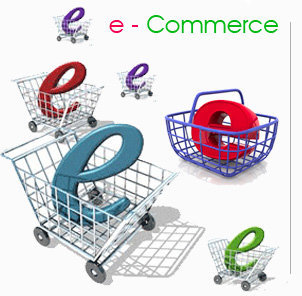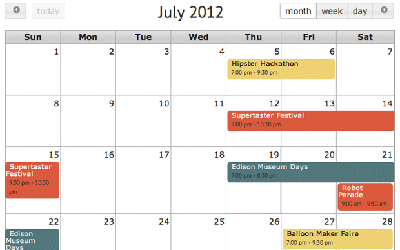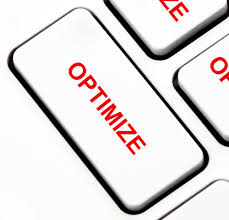Website Blog
Special Features on Websites
September 11th, 2015
Okay, you've built a company website. You've researched and optimized your keywords (and put them in the right place). You've added images and have optimized those images and optimized your keywords within those images. What else?
 Most high quality websites will have all of the above but will also have some special features. For example: if your company sells products then maybe you should have an e-commerce solution. Or maybe if you run a singles ministry at church, you may want an event calendar that shows all of the events that are planned for the month. That's just two of a myriad of special features you can add to your website that will make it unique and interesting.
Most high quality websites will have all of the above but will also have some special features. For example: if your company sells products then maybe you should have an e-commerce solution. Or maybe if you run a singles ministry at church, you may want an event calendar that shows all of the events that are planned for the month. That's just two of a myriad of special features you can add to your website that will make it unique and interesting.
Contact forms are a great idea for a website. RSVP forms have their place too! Making your company website interactive is a great way to get your potential customers involved. If you own a restaurant then you could have reservation system in place so your customers can reserve a day and time for dinner. News sites could have an RSS feed that would bring in constant new content with breaking news. People could sign up for news alerts to be sent directly to their cell phone.
I have lots of customers with an email client installed onto their website. From this extension, the business owner can design (or I can design them for them) and send out email blasts to their customer base with new offers and news about whats going on. If designed correctly, they can send these emails out free of charge. This will be a huge savings going forward for these particular business owners. The pricing of email marketing has been getting very expensive. This is where having a way to send your own emails can really pay off. And you can launch these emails directly from your website!
 An art gallery (or an artist themselves) can create a feature rich art gallery right on their own website. You can show off all of your newest art. You can combine a gallery with an e-commerce extension and show and sell your artwork right from your own website.
An art gallery (or an artist themselves) can create a feature rich art gallery right on their own website. You can show off all of your newest art. You can combine a gallery with an e-commerce extension and show and sell your artwork right from your own website.
Special features on websites create excitement, function and interaction. Websites have come a long way from the original sites that just provided content. People want to get involved. Does your site create that option? This is just one way to upgrade your website.
Nuff said for now,
Some SEO Tidbits (Keywords).....
April 6th, 2015
Understanding keywords and keyword search.....
Being found high up on Google search can be easy or extremely hard. It depends on so many things. Today we will focus on keywords, keyword phrases and search terms.
For example: let's say we own a plumbing company. So we do a keyword search to find the most searched for terms in the plumbing industry. Keywords and keyword phrases such as plumbing, plumber, home plumber, plumbing repair, toilet installation, drain cleaning and so on....(anything somebody may use as a search term when they do a Google search).
As we look for the most searched terms we can then know which keywords and keyword phrases that we should populate our website with. If there are 96,000 searches a month for the keyword phrase "home plumber" and only 1,200 searches a month for the keyword "plumber that will come to my home" then of course we want to use the keyword phrase "home plumber" over and over again in our content. Here is where I will mention keyword density. Keyword density is basically how often a keyword appears in the content text of your website compared to how many overall words are there. If you have 100 words or phrases on your website and the keyword "plumbing" shows up 10 times then your keyword density is 10%. The more your target keyword shows up in your text the more relevant Google finds your website for that particular keyword. So if someone searches for a home plumber and you have "home plumber" listed numerous times on the home page of your website then Google says "Hey, this site is really about home plumbers" and they rank you higher for that search term and display your website higher in the search results.

You must understand that "home plumber" is not the same keyword as "home" or "plumber". If someone searches for "plumber" then your site will register because you have that search term but Google's algorithms knows that your main keyword is really "home plumber" and not plumber so you will get less SEO juice. You will still get some but not as much as someone searching for "home plumber". Google knows what you are trying to get across and will index you accordingly. You may appear on the first page of Google search results for someone searching for "home plumber" but on page three for "plumber".
So if you want to rank for "plumber" and for "home plumber" then you need to optimize both terms and increase your keyword density in your content for both.
Now here's where you can't get greedy. Let's say after doing a keyword search you find all of the keywords and keyword phrases that most people will use to find your company. Then you cram your website with keyword phrase after keyword phrase. You go for the world record of keywords jammed into one home page. You think that will ensure you are found number one on every Google search. Well, not so fast.
Google is not stupid. They know when someone is trying to job the system. If they perceive that your website content doesn't read naturally, that it has so many keywords and keyword phrases in it that it is an obvious attempt at ranking high in search then Google will penalize your site and your website will plummet in the rankings. So there is a balancing act between having enough keywords dispersed throughout your site and having it read naturally.
So, you need to find the correct keywords and keyword phrases to populate your site with. Then you need to have them in the text of your site and have them appear often and appear in a natural way.
Now, you may do everything right and still find yourself on the 2nd page of Google search results and you wonder why. There are many many reasons for this. Let's name a few here:
1. Other companies in your profession also have a webmaster who knows these things and they have optimized their site too.
2. Other sites may have more quality back links than you do (other websites that link to their site).
3. Other sites may have a longer track record with Google and thus has Google's trust and thus will almost always show higher up in search results (this can be combated)
4. You may be located in a city with lots and lots of competition. They all are trying to be number one on Google (and everybody can't be number one!)
5. You may be in a city with no competition and therefore easily rank number one because nobody else is in your area (landing pages can work really well here to get a site ranked high in a certain geographical area where there is little competition)
Lastly, I would like to touch on keywords that have low search volume. Normally you would like to rank for the most often searched for keyword or keyword phrase. If your website ranks well for a large volume search term then you have a great chance of showing up more often in people's searches. But keep in mind, the higher the search term volume, the higher the competition. If you choose to rank for a low volume search term then maybe you will always show up high in the rankings for that particular keyword. Since it is a low volume search term, very few will optimize that keyword or keyword phrase. If you are the only one that optimizes that low volume keyword then you will always show for that keyword or keyword phrase because Google finds your website relevant for that low volume keyword and doesn't find other sites relevant at all. Not many searches but no competition either.
Nuff said for now, eh?
A Few Reasons for Having a Website.....
January 1st, 2014
 So what are the reasons you should have a website if you own your own business. Well there are plenty of good sound reasons to have a website so let's just name a few, eh?
So what are the reasons you should have a website if you own your own business. Well there are plenty of good sound reasons to have a website so let's just name a few, eh?
1. You can have a website for marketing reasons. If you've ever paid for print advertising or yellow page ads then you know how expensive those types of marketing can be. They run into the thousands of dollars and once the ad is gone, it's gone. Now on your website, you can create an ad for a fraction of what the print ads will cost (and I mean a fraction). And once you've created a marketing page on your site, you can leave it there forever if you want to. It'll never "be gone" unless you want it to go away. For that matter, once a page is made, you can put it up on your site, then take it down and put it up again at a later date. It'll always be there (whether it's live on your website or not). It's not like print ads where they're here today and gone tomorrow (which means you have to get more bang for your buck while the print ad is running because like I said before, once it's gone, it's gone). And so is the money spent on the ad. So let's hope you got your money's worth with that print ad. Whereas the website ad will continue to draw customers for you for as long as you want it showing on your web site. Now that is a great value!
2. A website will not only draw you new customers but it will also substantiate your business. Lots of people won't use a business that doesn't have a website. They feel like: no website then the business maybe isn't legitimate or maybe a fly by night company. They just feel that if you have a website then maybe you'll be around for a while. They feel like the website is a permanent structure and makes you trustworthy to deal with. Trust me, this is how customers think. So having a website for your business is essential in most cases.
3. You can use your website to inform people and customers of what you have going on. Maybe you have a sale on a certain product that your supplier is closing out. Maybe they have a couple of water heaters they are closing out cheap. You can use your website to announce this "great deal" that you have and you just may find a customer that is looking for just what you have to offer. Somebody that would never have found you otherwise. Or you are offering a limited time deal on some sort of service. Like maybe offering furnace checkups at a discounted price in the fall. You know people are looking to get this done before the cold weather sets in and they will be looking (online of course) for deals on this service. They may as well find you (unless you don't have a website of course......) because then they won't find you!
4. Another reason for having a website is to let potential customers know about you and your services. Letting them know your hours of operation and if you have a store then letting them know how to get to your location. This is a place that you can let customers know how long you've been in business. You can put testimonials on your site letting customers know just how great you really are.
I can go on and on about why having a website is not only essential to any business in the 21st century but is cost effective, informational and another way for customers to get a hold of you. What are you waiting for?????
Nuff said.......
Smush It.....
March 3rd, 2015
Continuing in the vein of site speed concerns, this week we'll tackle image optimization.
Back in the day, lots of websites had text only. Or content. They were mainly for informational purposes only and how they looked was a secondary concern. These days websites are used for anything and everything so how they look can be paramount. The use of images, videos and any other number of features is what makes a website look great. People won't spend much time on a website that has text only and looks boring. People want to spend time on a website that is visibly entertaining. A website that will stimulate the senses.
 So the use of pictures is a great idea to beautify the appearance of any website. The problem arises when the pictures are too big. A website with lots of images that are 2400px by 2100px will load slowly. Even if the image has been scaled down by the web application, the original image is still huge. So when a browser downloads a website with lots of large pictures it takes a lot longer to load.
So the use of pictures is a great idea to beautify the appearance of any website. The problem arises when the pictures are too big. A website with lots of images that are 2400px by 2100px will load slowly. Even if the image has been scaled down by the web application, the original image is still huge. So when a browser downloads a website with lots of large pictures it takes a lot longer to load.
Every picture on your site should be optimized to load quickly. One way of doing that is to only store images on your site that are the actual size that you want presented on your website. Even then the image can be smushed (optimized) so that it takes up even less bandwidth and space. So when the web browser loads your website it will load much smaller and thence much faster.
All images should be scaled down to the optimum size and then smushed (optimized) to even a smaller footprint before loading them onto your website. This will ultimately speed up your website which will help your Google rankings.
Nuff said......
Site Speed Continued.....
February 14th, 2014
Continuing in the same vane as last week, we will look at site speed issues again this week.
I just came across a blog that did a review on free (not really free) or cheap (not really cheap) website creation companies that offer a "build it yourself and save money" type of business model. They will push the fact that you don't have to have any knowledge of coding. You can build a website with the drag and drop method.....

Lots of things wrong with this.
1. You are restricted to what they offer when it pertains to customization. You can't customize your website any way you want because they only offer certain looks and layouts. This can be a huge problem or no problem at all depending on what you want to accomplish with your website.
2. Lots of extra code is included in every website you build because all of the tools you use to make your website are coded into the website behind the scenes. This creates a low quality website with lots of clutter in the code. This can affect your Google rankings, site speed and other loading factors.
3. What about keyword search. They will offer some SEO tools but how do you know how to write your on page content. Probably one of the most important factors in Google rankings is your on page content. Which keywords are most searched for in your industry and how do you include them in your content? How will Google perceive your keywords? What about keyword density? Have you ever heard about that? Which keywords do you want to rank for? These low cost, DIY website creation companies won't help you with any of this will they?
4. What about Gzip compression, image sprites, optimizing your images for site load speed, smushing your images, parsing your javascript, minifying your CSS, HTML and Javascript, leveraging your browser caching etc, etc, etc? What are these low cost website design companies doing for you in these areas? These are all important issues in site speed performance.
A great site to use to check your site speed is GTMetrix. They will measure your site performance using Google's Page Speed Insights and Yahoo's YSlow.
This is all important stuff when it comes to Google ranking your site and how relevant your site becomes to certain searches. Anybody can build a website but can anybody build a website that will have built in value? Just because you have a website doesn't mean you will be "found on the Internet". Building a website the right way takes knowledge. Knowledge of what Google wants. Knowledge of how to get your site shown on the first page of Google. Otherwise, really, what is your site worth if it can't be found because it was built cheaply without any of these considerations in mind?
Next week CDN's.......(what the heck are CDN's? Tune in next week and find out....)
